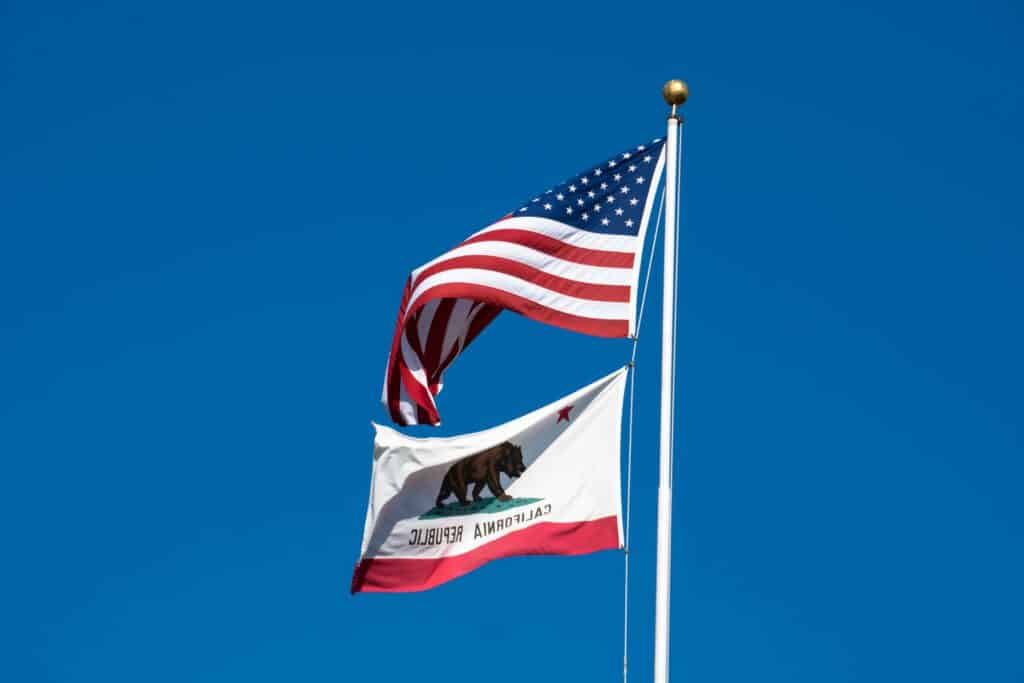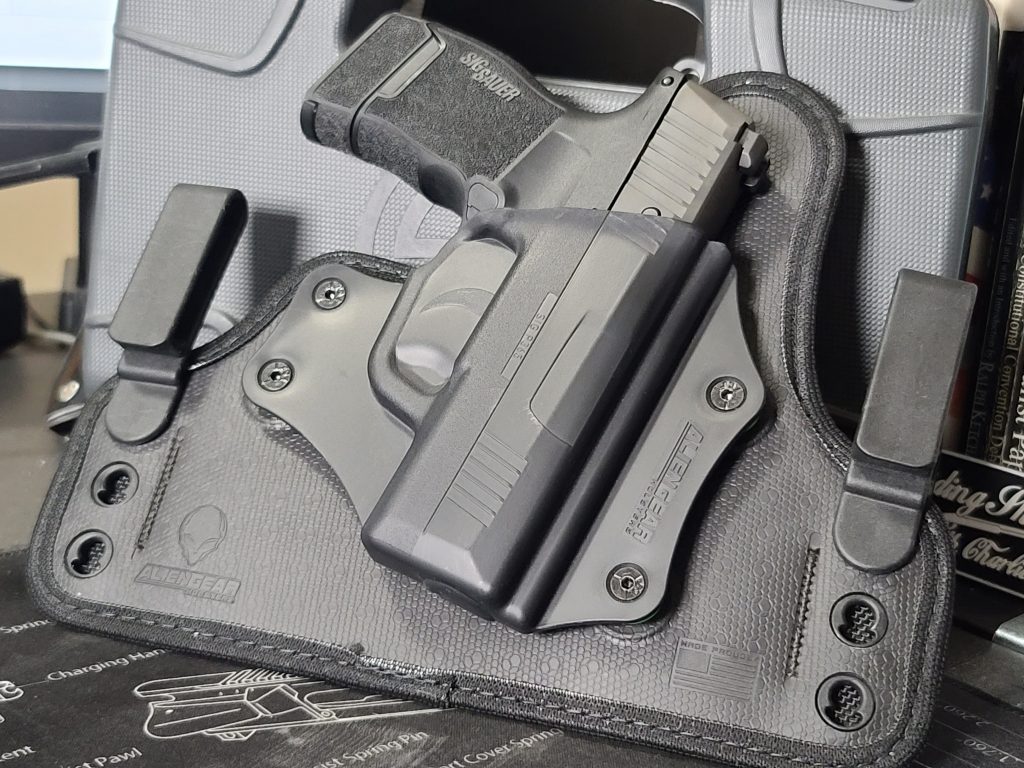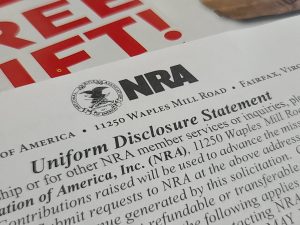When Texas passed its novel bounty law to incentivize residents to sue one another as a way to prevent abortions, I warned that blue state lawmakers would soon use the tactic to go after gun owners next.
Now, California has done just that. They’ve instituted the same bounty law but targetted at anyone who makes or sells “assault weapons.” Since the federal courts have failed to find a way to counteract this strategy, it will likely spread further.
But there’s an aspect of the law that’s gotten little notice despite being a monumental change. Towards the end of the law, one provision makes it far more likely that plaintiffs in gun-rights cases will be forced to pay the government’s legal fees.
Mark W. Smith explains why those who challenge California’s gun laws could have to pay huge sums to the state… even if they win their case.
Smith is an attorney and distinguished fellow at the Ave Maria School of Law. He’s also the host of the Four Boxes Diner YouTube channel. He gives a cohesive breakdown of the law and its potentially chilling effect on gun litigation.
Contributing Write Jake Fogleman looks at the reaction to the armed bystander who ended a mall shooting in Indiana last week. While most people hailed the bystander as a hero, the praise wasn’t universal. Jake examines why that is.
Plus, Bearing Arms’ Cam Edwards joins me on the podcast to talk about the House “assault weapons” ban.

Analysis: Examining the California Gun Litigation Trap Few Have Noticed [Member Exclusive]
By Mark W. Smith
California lawmakers just passed a law that will have an extraordinary chilling effect on Second Amendment rights—and it has received hardly any discussion.
The state’s latest move should scare anyone concerned about protecting the constitutional right to keep and bear arms. The measure can be found toward the end of SB-1327, which both houses of the California legislature recently passed. It awaits Democratic Governor Gavin Newsome’s signature. The goal? To block court challenges to California’s gun laws.
The dry, legalistic language obscures the significance: “Notwithstanding any other law, any person, including an entity, attorney, or law firm, who seeks declaratory or injunctive relief to prevent [California, local governments, or government officials] from enforcing any statute, ordinance, rule, regulation, or any other type of law that regulates or restricts firearms, or that represents any litigant seeking that relief, is jointly and severally liable to pay the attorney’s fees and costs of the prevailing party.”
What does this mean in plain English? If you challenge California’s gun-rights restrictions in court and lose any aspect of the lawsuit, you will be held liable for paying all of the government’s legal fees and costs.
This is a huge matter because the First Amendment affirms the right to “petition the Government for a redress of grievances,” and for more than 150 years, federal law has allowed plaintiffs to sue any level of government (federal, state, or local) for violations of constitutional rights. That is why so many civil rights protections have arisen from court challenges. Think of landmark cases involving free speech, equal protection, and voting rights.
Second Amendment rights, too. Only last month, the Supreme Court affirmed the individual’s right to carry firearms outside the home, all because the New York State Rifle and Pistol Association challenged New York State’s restrictive gun-carry law in court.
That is exactly the kind of case California is trying to thwart.
California’s new legislation discriminates against Second Amendment rights. The bill does not apply to any other aspect of the Constitution. It singles out challenges to any “law that regulates or restricts firearms.” Could you imagine if a state passed a law holding plaintiffs and attorneys financially responsible if they lost a court challenge to a “law that regulates or restricts voting rights or free speech rights”?
The language of California’s law becomes especially dangerous when it says that if a court “dismisses any claim or cause of action brought by the party seeking the declaratory or injunctive relief” or enters judgment for the government on any claim, the government is the “prevailing party” and is entitled to collect attorneys’ fees from the plaintiffs. In other words, if any part of the plaintiffs’ case goes away, those plaintiffs will need to pay up.
But it is common for plaintiffs’ attorneys to present multiple claims in a single case. If the court dismisses some of their claims but still strikes down the law in question as unconstitutional, the plaintiffs are satisfied. But now California is saying that if plaintiffs lose any aspect of their case, they will owe the government legal fees—even if the court strikes down the law!
In civil rights cases, it is routine for courts to decide the case based on one issue, granting victory to the plaintiffs, and to dismiss other claims as unnecessary. Under that scenario, it appears that the defendant–even though it lost the case–is nonetheless a prevailing party because the court “dismis[ed] any claim or cause of action brought by the party seeking the declaratory or injunctive relief.” Even if the plaintiff’s claim was not dismissed on the merits, the defendant is the one who collects attorney’s fees.
Think about the consequences of this law. Whether you are an individual, a nonprofit organization, or a business, you will be on the hook financially if you bring a case challenging a California gun law and don’t win on every claim. Attorneys’ fees in extended constitutional litigation can be huge, running into millions of dollars.
It is highly unusual for the government to be awarded attorneys’ fees in such litigation. It is unheard of to make the plaintiffs’ lawyers responsible for paying the government’s legal fees (unless the lawyers brought an obviously frivolous claim). But California’s bill does just that.
California claims to be motivated to enact this law because of a similar one in Texas that applies to abortion challenges. Even if true, that doesn’t make the law any better. Both the Texas law they mention, and the California law are infringements on Americans’ right to challenge unconstitutional policies.
Why would any individual, gun-rights advocacy group, or lawyer take on the risk of financial ruin to challenge California’s restrictive gun laws?
It gets worse. Normally, in cases that allow the shifting of attorneys’ fees, the court in which a case is tried either awards or denies the fees. But California’s statute says that the prevailing party can bring a separate lawsuit to obtain attorneys’ fees up to three years after the case ends. Because most Second Amendment litigation is brought in federal court, this language allows California to make an end run around the federal courts. California can bring a lawsuit in its own friendly state courts, bypassing the federal court that had initial jurisdiction over the underlying matter.
Then there is this: California’s new bill says that if the government sues to claim attorneys’ fees, the parties being sued cannot defend themselves even if the “court in the underlying action held that any provision of this section is invalid, unconstitutional, or preempted by federal law.” That is to say; it will not matter if a federal court holds that this new California law is unconstitutional. The state can still hold plaintiffs liable for its legal fees. This California provision flies in the face of the U.S. Constitution’s Supremacy Clause—and common sense.
And for the final blow, California’s statute ends with these words: “Any person, including an entity, attorney, or law firm, who seeks declaratory or injunctive relief . . . shall not be deemed a prevailing party under this section or any other provision of this chapter.” In other words, the people challenging a California gun law always lose. They can never be awarded attorneys’ fees.
This new law is a blatant attempt to stop people from challenging California’s oppressive firearms laws. It is likely unconstitutional. But will someone be willing to challenge it in court? And even if so, how long will it take for the legal process to play out?
California’s move may also be a sign of things to come from other deep blue states. Now that the Supreme Court has reaffirmed the Second Amendment right to keep and bear arms, expect to see many more frenzied efforts to curtail gun rights by any means, fair or foul.

By Stephen Gutowski
Democrats on the House Judiciary Committee voted to move an “assault weapons” ban for the first time in decades this week.
The move came as a bit of a surprise. Democrats haven’t passed an assault weapons ban at the federal level since the original one expired in 2004. They didn’t include one alongside the other measures in the gun-control package they passed in the wake of the Uvalde shooting.
So, I brought Cam Edwards from Bearing Arms on to discuss the changing tides. Cam is one of the most insightful pro-gun writers out there and has been for a long time. He follows gun developments in Congress as close as anyone.
He said the move is perplexing in light of the latest polling. Assault weapons bans have actually lost support since Uvalde. Quinnipiac University found support for a ban at an all-time low this week. And that drop in support has coincided with their increased popularity. The National Shooting Sports Foundation reported more than 24.4 million ARs and AKs in circulation this week.
Cam said Democrats are trying to use the ban as a wedge issue for their base. However, he doesn’t see how the politics of passing the ban could help Democrats overcome the uphill battle they’re facing in the midterm elections. He argued a show vote, which is what this will end up being if it does pass, is not going to satisfy most gun-control activists anyway.
He also laid out how much of an “if” this vote really is. Democrats still don’t have all the votes nailed down. They might not ever get there.
Plus, Contributing Writer Jake Fogleman and I talk about the armed bystander who ended an Indiana mall shooting.
You can listen to the show on your favorite podcasting app or by clicking here.
Video of the full episode is also available on our YouTube channel.

Analysis: How the Indiana Mall Shooting Became a Gun Policy Rorschach Test [Member Exclusive]
By Jake Fogleman
In the days following the active shooter incident at Greenwood Park Mall in Indiana, investigators have released clarifying information as to how the attack transpired.
We now know that the armed civilian who intervened in the attack was a 22-year-old Indiana man named Elisjsha Dicken. Dicken stopped the shooter a mere 15 seconds after the attack began when he fired ten rounds from his own handgun, striking the gunman eight times, fatally wounding him.
Three innocent people were tragically killed in the attack, but for the bravery and swift action displayed by Dicken, many others would likely have been killed.
“His actions were nothing short of heroic,” Greenwood Police Chief James Ison said during a news conference on Monday. “He engaged the gunman from quite a distance with a handgun, was very proficient in that, very tactically sound. As he moved to close in on the suspect, he was also motioning for people to exit behind him. He has, to our knowledge, no police training and no military background.”
While Dicken’s actions received praise from local law enforcement and state government officials, some public figures were less willing to praise his actions. A few were even critical, with several leaders of gun-control groups labeling his actions either that of a vigilante or even a criminal.
The divergence is likely because the circumstances surrounding the shooting intersected with several long-standing controversial policies that animate both gun-rights and gun-control advocates. That allowed the opinions of the incident to quickly diverge, revealing much about the state of the gun debate in the process.
Permitless Carry
Gun-control advocates, who have been highly critical of the nationwide trend toward permitless carry in the past, seized on Indiana’s new permitless carry law in the immediate aftermath of the shooting.
“A gunman shot and killed 3 people and injured 2 others at a mall in Greenwood, Indiana,” the gun control group Brady tweeted. “This tragedy comes after Indiana repealed its requirement for a permit to carry a handgun in public, which went into effect July 1. More guns in public spaces do not make us safer.”
However, that law did not have any bearing on this particular attack. Indiana’s new permitless carry law applies only to handguns, whereas the Greenwood Park Mall shooter reportedly carried out his attack with an AR-15 style rifle—to say nothing of the obvious illegality of shooting innocent people. In fact, the only effect of the law was that it allowed Dicken to be armed in defense against the attacker. He did not have a permit to carry, but was carrying under the protections of Indiana’s permitless carry scheme.
The National Rifle Association was quick to celebrate that fact while highlighting its own role in making that policy law in Indiana.
“16 days after NRA-backed Constitutional Carry went into effect, a law-abiding 22-year-old stopped a shooter at Greenwood Park Mall in Indiana,” the organization tweeted. “Constitutional Carry saves lives. Half the country has enacted it and NRA led the way.”
Gun-Free Zones
Likewise, Dicken had his firearm on him despite the Greenwood Park Mall’s “no weapons” policy.
Gun-rights supporters pointed to the fact that the shooter still attacked the mall despite its weapons policy, and claimed it as another indictment in the case against so-called gun-free zones. Meanwhile, gun-control advocates saw the good Samaritan as a scofflaw whose heroic deeds should not overshadow a broader need for stronger gun control laws.
“I don’t know who needs to hear this but when a 22-year-old illegally brings a loaded gun into a mall and kills a mass shooter armed with an AR-15 after he already killed three people and wounded others is not a ringing endorsement of our implementation of the Second Amendment,” Shannon Watts, founder of Moms Demand Action, wrote in a since-deleted tweet.
It’s worth noting that in Indiana, “no guns allowed” policies and other such signage do not carry the force of law. So, violating the policy is not akin to violating the law. Though, a person could face criminal sanction under trespassing laws if they refuse to leave at the request of a property owner.
In this case, however, it does not appear that the Greenwood Park Mall is interested in pursuing any such recourse against Dicken. Instead, The mall’s property owners put out a statement expressing gratitude for his actions.
“We grieve for the victims of yesterday’s horrific tragedy at Greenwood Park Mall,” a Simon Property Group representative said. “Violence has no place in this or any other community. We are grateful for the strong response of the first responders, including the heroic actions of the good Samaritan who stopped the suspect.”
“Good Guy with a Gun”
“The only thing that stops a bad guy with a gun is a good guy with a gun” has been a long standing shibboleth of the NRA and aligned organizations since the aftermath of the Sandy Hook shooting in 2012. So, naturally, in a case where an armed civilian successfully intervened in a shooting, the debate over the sentiment was sure to reemerge.
Gun-control advocates were quick to downplay the significance of armed civilians playing a role in combatting active shooters.
“It is a stroke of luck that a fellow visitor at the mall was able to neutralize the shooter – as we know that multiple studies over numerous years show that the that a ‘good guy with a gun’ is a myth pushed by the gun lobby and that vanishingly few active shooter situations are resolved by armed civilians,” Brady President Kris Brown said in a press release, walking back previous comments implying Dicken was a vigilante.
The most recent FBI annual report on active shooter incidents found that of the 61 documented active shooter incidents in 2021, armed private citizens shot and killed an attacker in four of those incidents. In comparison, the shooter was killed by responding law enforcement officers in 14 of those instances the same year. Another 30 were taken into custody by police.
While it may not be true that a “good guy with a gun” is the only thing to stop active shooters in the past, the Greenwood Park Mall shooting and several other recent incidents highlights that armed bystanders can and do successfully intervene in certain cases.
So, was the armed bystander in this case a hero or vigilante? Were his actions proof of concept that armed civilians can effectively stop mass shooters, or is he a rare exception that should not be focused on in the gun policy debate? As indicated by some of the public responses in the aftermath of the shooting, your view of Elisjsha Dicken and his life-saving actions likely depends on your views on gun policy overall.
That’s it for now.
I’ll talk to you all again soon.
Thanks,
Stephen Gutowski
Founder
The Reload





